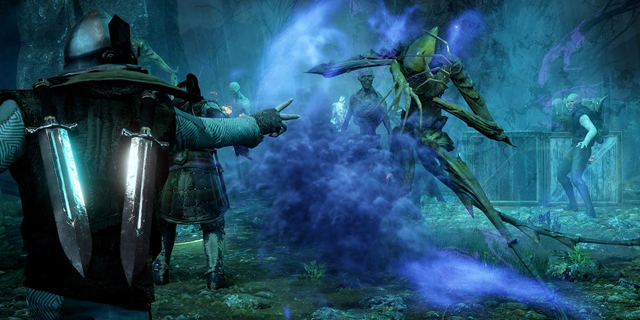
When you think of Western RPGs, the name BioWare is bound to pop up. It has created some of the finest and most well-regarded titles in that genre, turning a once-modest studio into one of the foremost RPG experts. Despite BioWare’s rich history, many fans have been disappointed in its recent efforts, especially 2011’s Dragon Age II. The expectations for the third game in its large-scale fantasy series, Dragon Age: Inquisition, were cautiously optimistic.
No matter how you feel about BioWare’s modern titles, it’s safe to say Inquisition is a return to form for the team and a shining example of what it does best.
Inquisition’s story focuses less on the more personal, smaller narrative of Dragon Age II and returns us to a tale on a much larger scale. Your main character, eventually known simply as the Inquisitor, becomes a heroic figure in the eyes of the people and must embark on a quest to, as you might expect, save the world of Thedas. The overarching story, while steeped in fantasy traditions (for better or worse), has more meat to it than any other fantasy RPG I’ve played.
The majority of the beginning stages in Inquisition are very politically-driven, focused on appeasing specific groups and gaining their support to stop a threat that seeks to destroy all of Thedas. While the political intrigue and focus on building up an army is not unlike Mass Effect 3’s war assets, there is way more going on behind the scenes than you might initially guess.
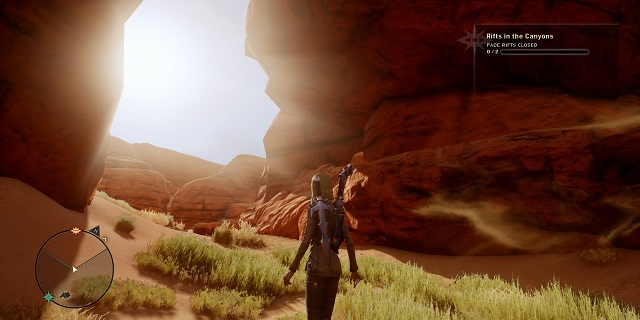
For instance, the race of your main character determines how certain people react to you. Playing as a human might wield more favorable results, but since my Inquisitor was an elf, I found myself met with many concerns, questions and threats. Elves aren’t the most popular folks in Thedas, making my interactions with many of the game’s characters, major and minor, way different than they might have been otherwise. This is a surprising level of nuance and makes my playthrough of Inquisition feel more personal as a result. It also breathes new life into a world that otherwise didn’t feel as cohesive in past games. This is one of the most important things for an RPG to get right, and Inquisition does it wonderfully.
It wouldn’t be a BioWare game without a large and diverse party of characters. Inquisition’s cast, containing a mix of both new and old faces, all perfectly complement one another and feature some of the better character moments in the series. I would often swap out characters in my party simply so I could hear them interact. A few of them didn’t always get along, but often that made for some of the funniest side conversations. These little moments give your group of adventures a bond that feels unique to BioWare games, but stands out even more in Inquisition due to how much time you spend exploring Thedas with your band of heroes and misfits.
You also learn about your companions through optional quests, allowing you to help them with an assortment of side objectives. In exchange, you learn information about their past and some more insight into their character or even their deeper motivations. One of these quests featuring my favorite member of the cast, Dorian, gives you background on his life prior to joining the Inquisition and, in just two scenes, explores a character most games would shove into the background, assuming they included them at all.
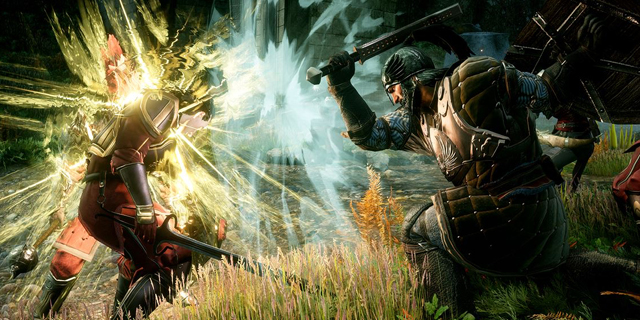
Thanks to brilliant writing and some powerful performances, BioWare managed to make a reunion between father and son one of the best scenes in the entire game and not in the ways you might expect. Best of all, it was entirely separate from the main story, yet became a driving force for my character and allowed me to bond with Dorian more than I ever would have otherwise.
Inquisition absolutely nails the world-building, character development and overall narrative, but it also plays fantastically as well. It almost feels like a combination of the best aspects of Origins and II. You have a large world to explore with hundreds of quests to do, an expansion of the core of Origins, but you also have smaller environments that feel not unlike Kirkwall from II. The combat is action-oriented, like II, but also features a tactical menu, giving you plenty of control over your party, closely resembling Origins’ battle system. It may seem BioWare is simply attempting to appease everyone, but instead it creates an expert blend of both gameplay styles without much sacrifice.
After the game’s opening sequence, you’re mostly free to explore the first area of the game, the Hinterlands. This environment is gigantic and full of various quests to complete, giving you plenty of opportunities to avoid the main story altogether for hours on end. It’s overwhelming at first, even for someone who is used to games like Skyrim, but once you get your bearings and have a little more freedom to juggle the various quests available to you, you’ll be hooked.
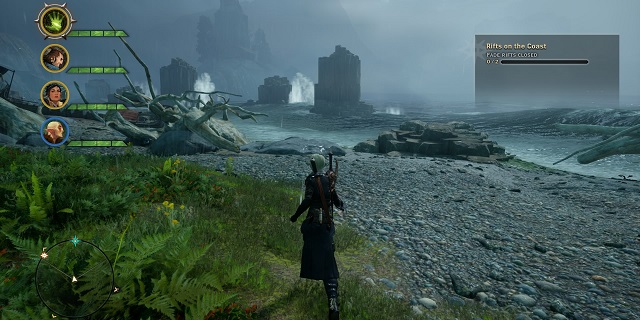
It also won’t be long before you discover your progress in the story (and ability to unlock other areas) is gated by a counter which increases the more you complete quests. Some might find this a little annoying, forcing you to complete side content you might otherwise pass up, but I feel it gives you more of an opportunity to both explore the various environments and take things at a slow pace. Inquisition is a long game, but it never feels like its padded out due to these restrictions. Instead, it provides you a good way to get the most out of your experience.
Thankfully, these roadblocks are minor at best. You could spend dozens of hours in the first area alone, but you’re never forced to. It doesn’t take too long to be able to unlock new places to explore and the game is quick to prompt you about when something new outside of where you currently are is available to explore. Just through normal exploration and by completing quests, both on and off the critical path, I never found myself unable to progress the story or go somewhere new.
Inquisition may bombard you with quests, but I never once felt obligated to complete all of them, simply go after the ones I found most intriguing. It’s an experience that can be played at your own pace; unless you try to rush through the story, you won’t feel forced to complete content you have no interest in.
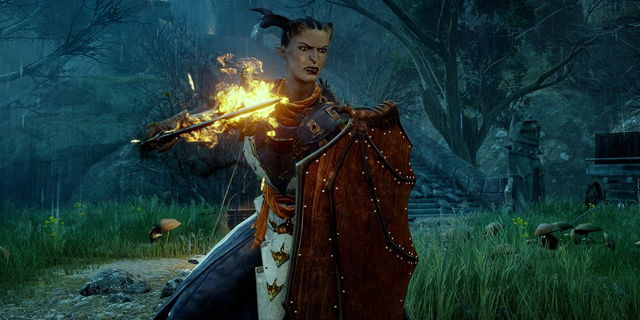
The majority of the side quests, while not groundbreaking in any way, are enjoyable enough and don’t bog down the experience. Despite that, a good number of these missions, specifically ones involving gathering various herbs and flowers, feel ripped straight out of a dated MMO. They are easy to ignore, but they feel a little out of place and unnecessary. Many of these do allow you to access Inquisition’s many different crafting systems, giving you more customization over your gear, but the crafting was almost never necessary, at least not on the game’s normal difficulty.
As mentioned before, combat is a careful mix of the action-oriented focus of Dragon Age II and the tactical planning of Origins. Those looking for a true return to the original Dragon Age will be disappointed, but it still provides the best of both worlds. The majority of your time in combat will be spent attacking traditionally and using special abilities, switching to other characters when necessary, but at any time you can active the tactical view and order your other teammates around. This was never a necessity during most normal encounters, but I found myself using it quite often while facing some of the tougher enemies and bosses. It’s not required by any means, but it gives those fans of Origins’ combat something more strategic to sink their teeth into.
The best use case of the tactical view is when you run into a dragon during your travels. Many of Inquisition’s environments feature a dragon roaming the land, ready to decimate whoever crosses its path. These battles are entirely optional, but feature a perfect excuse to really test out tactical combat in a brutal encounter. Tense and lengthy but undeniably rewarding, these dragon fights really showcase the combat at its best.
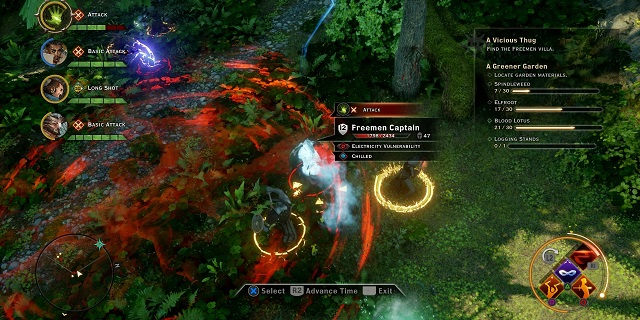
I would be remiss if I didn’t mention Inquisition’s presentation. It’s a visually stunning game, complete with an incredible amount of details. Each area you explore is vastly different from the last, making the world seem even larger than it already is. From the forested Emerald Graves to the rainy Storm Coast, every environment feels like a painting brought to life in vivid detail. Complete with a heart-pounding score from Trevor Morris that features more personality than found in the previous two Dragon Age titles, Inquisition’s presentation will undoubtedly leave you with much to remember.
Complementing Inquisition’s large scale is a good number of technical issues. Some of these are minor bugs, such as audio cutting out randomly or characters floating, but I would occasionally encounter some that forced me to restart the game entirely. There were also a handful of crashes that occurred; the game’s frequent auto saving made it less of a hassle, but it still was an unfortunate problem that often took me out of the experience in the middle of a riveting conversation or tense battle. These problems don’t ruin the experience by any means, yet they pop up just often enough to put a damper on an otherwise fantastic experience.
Thanks to some stellar writing, fantastic characters and a dense and exciting world to explore, Dragon Age: Inquisition might be BioWare’s finest game to date. It’s not without its faults, but for every misstep there are at least five excellent original ideas in place. Like any worthwhile RPG, Inquisition truly feels like an adventure, one you won’t soon forget.
Pros: Brilliant writing, characters and story, gigantic world to explore, exciting combat
Cons: Some tedious side content, technical issues



















